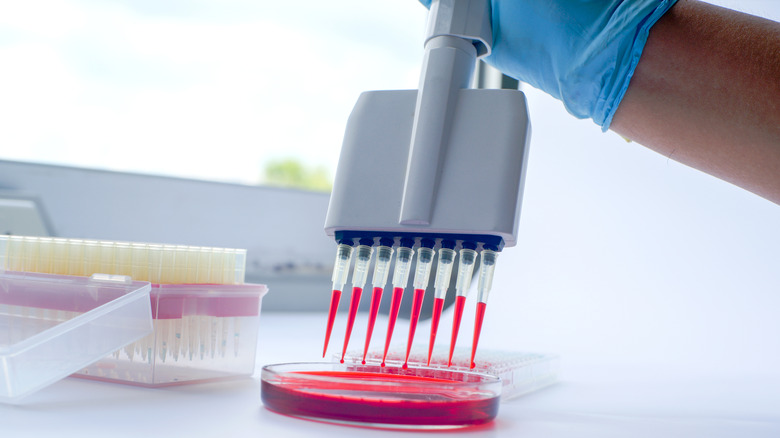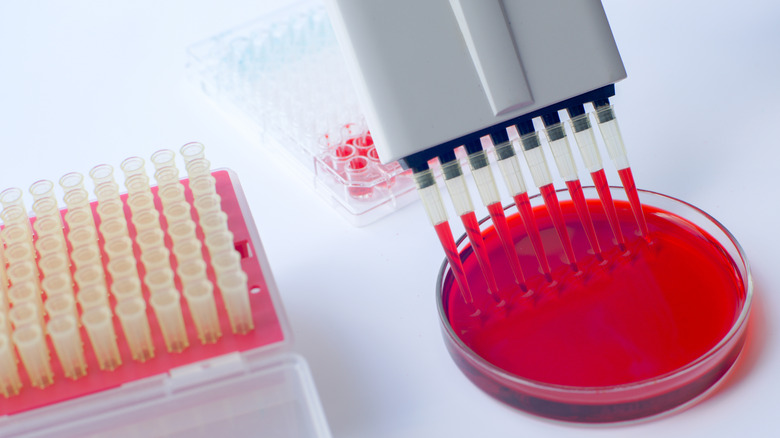What Does It Mean When Your Blood Total Protein Is High?
According to MedlinePlus, proteins are complex molecules vital for the functioning of organs and tissues. The body has at least 10,000 different proteins found in almost every part of your body, including the muscles, bones, hair, and skin (per Harvard T.H. Chan). According to a 2022 review published on StatPearls, proteins in the blood come in two main types: albumin and globulin. Generally, these two protein types have different characteristics.
Albumin is the main protein in the blood that helps transport substances (such as hormones and drugs) throughout the body. According to the Cleveland Clinic, albumin is produced by the liver, and the normal albumin range in adults is between 3.5 and 5.0 grams per deciliter (g/dl).
On the other hand, a combined effort from the liver and the immune system is needed to make globulins. These proteins play a vital role in blood clotting, liver function, and fighting off infections, per MedlinePlus. Between 2.0 and 3.5 g/dl is deemed a healthy range for globulins.
You'll need a blood test to determine whether your blood protein levels are in the normal range. The test is often part of a comprehensive metabolic panel (CMP), per Healthline.
If your results show high protein levels, there might be various causes, and your doctor might recommend other tests to understand what's causing your blood protein levels to rise. Read on to find out what it means when your blood's total protein is high.
What causes high blood protein levels?
High blood protein is called hyperproteinemia, according to the Cleveland Clinic. The causes vary and include poor hydration, chronic inflammation, severe liver or kidney disease, viral infections, and certain blood cancers such as multiple myeloma and lymphoma.
Multiple myeloma happens when plasma cells produce an abnormal protein called M protein, which is made in the bone marrow (via WebMD). According to the American Cancer Society, one type of lymphoma that spikes protein levels is called non-Hodgkin lymphoma (NHL). This condition causes the cancer cells to make large amounts of an abnormal protein known as macroglobulins.
As the Mayo Clinic reveals, certain proteins in your blood naturally increase as you battle an infection. Given this, hypoproteinemia isn't a specific condition but a potential side effect of several other conditions or complications. For example, excess protein waste can build up in your blood due to a kidney malfunction, per the National Kidney Foundation.
Diagnosis and treatment
Because high blood protein levels are often linked to a specific medical condition, diagnosis and treatment depend on what's causing the spike.
Your doctor might recommend additional tests to uncover underlying conditions. One example is the serum protein electrophoresis (SPEP) test, which can help identify the protein type and source (e.g. the bone marrow or liver) involved in your high blood protein (via Drugs.com).
According to Healthline, SPEP can help explain fatigue, constipation, excessive thirst, and other symptoms that you may experience due to a condition affecting the proteins in your blood serum. Your doctor might schedule multiple tests after the initial one and these future tests help your doctor measure your progress after a diagnosis.
The factors influencing blood protein levels are numerous, according to Cleveland Clinic. That's why it's crucial to attend all your doctors' appointments, even after the initial one, and take into consideration the next steps that they recommend.



